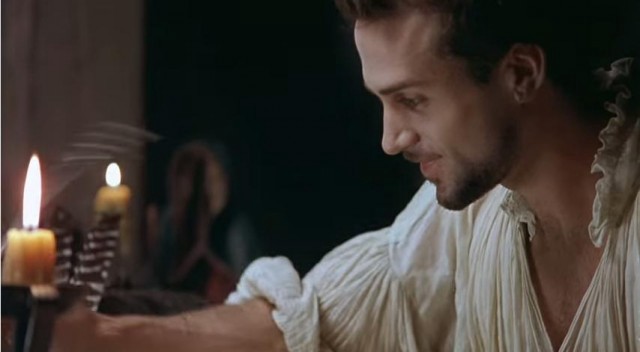Art Just Hasn’t Been The Same Since We All Left Our Garrets

Over the holiday break, my favorite publication The Atlantic released a William Deresiewicz essay titled The Death of the Artist — and the Birth of the Creative Entrepeneur.
People started asking me if I had read it.
The essay begins: “Pronounce the word artist, to conjure up the image of a solitary genius. A sacred aura still attaches to the word, a sense of one in contact with the numinous.”
Those are just the first 30 words in the 3,579-word piece, and already I am waving my hands at my laptop screen, wanting to say so much about how artists aren’t solitary geniuses and… and… the numinous? As in, special genius loner artist in contact with God?
According to Deresiewicz, there are a lot of people making art who fall short of this hallowed definition of artist. Shakespeare, in fact, isn’t an artist. Seriously. That’s a direct quote: “Shakespeare wasn’t an artist, he was a poet, a denotation that is rooted in another word for make. He was also a playwright, a term worth pausing over. A playwright isn’t someone who writes plays; he is someone who fashions them, like a wheelwright or shipwright.”
The craft vs. art argument gets tossed around a bit — guess if you put in the time and learn how to wright something your work is worth less than Solitary Genius’s art, which springs out fully-formed after a conversation with God — and then we get to the crux of the piece: art isn’t the same now that we all expect money for it.
To quote Deresiewicz:
The artist’s progress, in the postwar model, was also professional. You didn’t burst from obscurity to celebrity with a single astonishing work. You slowly climbed the ranks. You accumulated credentials. You amassed a résumé. You sat on the boards and committees, collected your prizes and fellowships. It was safer than the solitary-genius thing, but it was also a lot less exciting, and it is no surprise that artists were much less apt to be regarded now as sages or priests, much more likely to be seen as just another set of knowledge workers. Spiritual aristocracy was sacrificed for solid socioeconomic upper-middle-class-ness.
There is so much wrong with this that I want to pull out the Madeline Kahn “flames on the side of my face” gif, but let’s just start with “solid socioeconomic upper-middle-class-ness,” because IN WHAT UNIVERSE? Do I need to cite Molly Crabapple or Cheryl Strayed? My understanding of creative and artistic careers, even for the people who sit on boards and earn fellowships, is that you can earn a decent living but you can’t expect solid socioeconomic upper-middle-class-ness. As John Roderick puts it: if you’re successful, you can make as much money as a dentist.
I’m also a little put off by the idea that this model is “less exciting” than Solitary Genius in a Garret With the Numinous. (First of all: many of us are still working in garrets. If my apartment does not qualify as an artist-level garret then I don’t know what does.) Building your craft is exciting! Collaborating with other people is tremendously exciting! Earning enough money to take artistic risks is the most exciting excitement of all!
Fine, I am going to quote Molly Crabapple directly:
A decade of practice honed my talent. But cash let me express it. To pretend otherwise is to spit in the face of every broke genius who can’t afford materials or time.
I want to say so much about how making art has always required other people, has nearly always required some kind of cash or support system, is so very rarely ever Solitary Genius in Terrible Attic with Rats and God. Even Picasso’s Les Demoiselles d’Avignon, which Deresiewicz cites as an example of real art (not like that Billy Shakespeare stuff), well: Picasso was hanging out with his friends, getting to know art dealers, working within the cultural conversation of the time. He didn’t “hole up in a garret to produce your masterpiece, your Les Demoiselles d’Avignon or Ulysses, and wait for the world to catch up with you.”
The last third of Deresiewicz’s essay is “and then the Internet ruined everything,” first because it put the emphasis on networking, building an audience (instead of building your craft) and sullying your hands with running a business — because Shakespeare never had to worry about audiences and Picasso never had to think about business — and second because:
The new paradigm is also likely to alter the shape of the ensuing career. Just as everyone, we’re told, will have five or six jobs, in five or six fields, during the course of their working life, so will the career of the multiplatform, entrepreneurial artist be more vagrant and less cumulative than under the previous models. No climactic masterwork of deep maturity, no King Lear or Faust, but rather many shifting interests and directions as the winds of market forces blow you here or there.
A lot of us entreprenurial types aren’t even yet 35, yo. You have no idea what our climactic masterworks of deep maturity will be.
I should add, as a closeout, that I don’t think of myself as an artist. I am a storyteller, a comedian, an occasional nerd musician, and a hack writer. I do live in a garret, I don’t try to communicate with the divine, I work in collaboration with other people, and I am very, very glad to earn as much as a dentist.
Support The Billfold
The Billfold continues to exist thanks to support from our readers. Help us continue to do our work by making a monthly pledge on Patreon or a one-time-only contribution through PayPal.
Comments